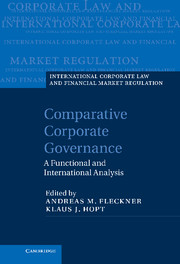25 - Introduction and questionnaire for the country reporters
from Part III - Annex: Questionnaire
Published online by Cambridge University Press: 05 July 2013
Summary
Definition of corporate governance
The term “corporate governance” is relatively new; in most jurisdictions it is not a legal term and its definition is ambiguous. For the purposes of this comparative work, the definition of the Cadbury Commission of 1992 is preferable: corporate governance is “the system by which companies are directed and controlled.” Both direction and control is relevant for a corporate governance system. More specifically, shareholder or stakeholder orientation characterizes the system. So does the prevailing shareholder constituency of a country (public companies with dispersed shareholdings as in the US, or many blockholdings, family corporations, and groups of companies as in many continental European countries). Accordingly, the prevailing principal–agent conflicts differ: between the shareholders and the board or between the controlling shareholder and the minority shareholders. A third principal–agent conflict exists between the shareholders and other stakeholders.
Internal and external corporate governance
Corporate governance is not just a question of the internal balance of powers within a corporation, but that is the focus. The main questions here concern the board (unitary board or two-tier board), the shareholders, possibly labor, and of course the audit system. The audit system consists of the audit committee of the board and the auditors of the company (in some countries internal auditors, in most countries external auditors). External auditors are in a hybrid situation between internal and external corporate governance because they are involved in the company's financial reporting, but must be independent.
- Type
- Chapter
- Information
- Comparative Corporate GovernanceA Functional and International Analysis, pp. 1095 - 1102Publisher: Cambridge University PressPrint publication year: 2013

